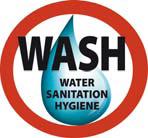/sub-categories/success-stories-and-case-studies
Success Stories and Case Studies
India WASH forum e-newsletter - Update 13 July 2010
Posted on 02 Aug, 2010 11:56 AMWe see this newsletter as a platform for independent credible voice in the water and sanitation sector. Our emphasis is on bringing together critical news and information with analysis. In this issue we share news and analysis on topical issues and developments.
The Department of Drinking Water and Sanitation(DDWS) has simultaneously invited inputs to Discussion Papers on Drinking Water and Sanitation, circulated on Solution Exchange. Inputs given by India WASH Forum, on this, is enclosed in this Update. We have pointed out the missing elements of sanitation improvement strategy that include, criticality of providing water as an inseparable component to household sanitation, the tendency to see behavior change as a lifestyle issue and not linked to the hardware components, peoples livelihoods and living conditions. Suggestions for what needs to be done to strengthen the implementation mechanism of the flagship sanitation programme(TSC) and partnerships.
More rice for people - More water for the planet - A WWF-ICRISAT report about System of Rice Intensification
Posted on 02 Aug, 2010 02:08 AM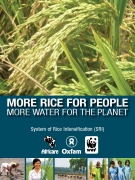 This project report by WWF-ICRISAT begins by highlighting the importance of rice as a major source of calories for half the world’s population and also as the single largest source of employment and income for the rural population.
This project report by WWF-ICRISAT begins by highlighting the importance of rice as a major source of calories for half the world’s population and also as the single largest source of employment and income for the rural population.
It makes connections between rice production and its impact on the environment and argues for need to adopt techniques such as System of Rice Intensification (SRI) to improve produce and reduce the damage to the environment.
For example, current practices at genetic uniformity can make crops more vulnerable to pests and diseases. They are also wasteful of increasingly scarce and costly resources such as water and fossil fuels. Heavily fertilised, continuously flooded rice fields produce greenhouse gases that contribute to global warming, and misuse of inorganic fertilisers and agrochemicals results in soil and water pollution. Evidence indicates that there has been a gradual slowdown in the yield gains of rice in many countries.
Project Boond - V, a comprehensive mitigation initiative in the drought prone regions of Bharatpur
Posted on 21 Jul, 2010 01:47 PMWith the failure of monsoons in Rajasthan and dry-up of the Bilaspur dam, the water situation assumes graver proportions in most parts of Rajasthan, besides Jaipur, Tonk and adjacent districts. These areas, now in the news for acute water shortage problems, have always depended upon monsoons for their traditional rainwater-harvesting systems and the riverine sources.
While the Government has taken remedial measures with construction of tube-wells across the rural and drought-prone areas, they have been sporadic and insufficient at their best. Merely announcing relief measures and planning of schemes on paper as an immediate disaster management strategy are not solutions to mitigation of water problems in this State.
Augmenting groundwater resources by artificial recharge: A case study - Kolwan valley - A report by ACWADAM
Posted on 19 Jul, 2010 04:45 PM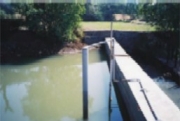 This report by ACWADAM describes the results of a research study conducted under the DFID funded AGRAR project at the Kolwan site in Pune district of Maharashtra state in India. The research focused on studying the usefulness of artificial recharge to augment groundwater resources through watershed development.
This report by ACWADAM describes the results of a research study conducted under the DFID funded AGRAR project at the Kolwan site in Pune district of Maharashtra state in India. The research focused on studying the usefulness of artificial recharge to augment groundwater resources through watershed development.
An important criterion of the study was also to understand the impact of artificial recharge on already changing livelihoods in areas where watershed development was conducted on a large scale.
Seeds of hope - Case studies from the Planning Commission and Lokayan
Posted on 12 Jul, 2010 03:33 AMThis set of case studies is part of a book prepared by Lokayan in collaboration with the Planning Commission titled “Seeds of Hope", covers themes of agricultur
Conservation of lakes - Myths and realities of desilting
Posted on 09 Jul, 2010 11:11 PMDesilting is becoming a major component of any Lake Conservation Project now a days. The basic reasons given for necessity of desilting are - increasing the storage capacity and checking eutrophic conditions.
As it is not practicable to reverse the slow process of silting in the bed of lakes through which only silt can be removed, there is no word like 'desilting' in any standard English dictionary. What we are doing in the name of 'desilting' is practically 'digging' or 'excavation' of lake bed. By so called desilting, the original lake bed is disturbed which has far reaching adverse effects on the performance of the lake. Most visible effect is the increase in percolation rate resulting in heavy seepage losses through the lake bed as observed after massive desilting at Pushkar lake in 2009.
Democratisation of water management as a way to reclaiming public water: The Tamil Nadu experience
Posted on 02 Jul, 2010 12:48 AMThis document describes the efforts made by the Tamil Nadu Water Supply and Drainage Board (TWAD), to tackle the growing water crisis in the state and describes how it addressed it very differently, unlike the previous reform strategies.
Water vs energy - IEEE Spectrum magazine special report
Posted on 30 Jun, 2010 02:54 AM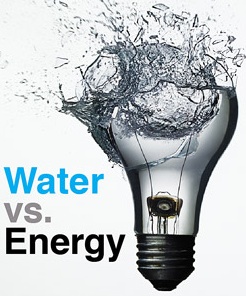 The IEEE Spectrum magazine, the flagship publication of the IEEE, the world's largest professional technology association, recently brought out a special report on Water vs Energy. The report contains three main sections - Thirsty Machines (Water, Energy and Industry), Uneasy Harvest (Water, Energy and Agriculture) and Tiny Test Beds (potential solutions).
The IEEE Spectrum magazine, the flagship publication of the IEEE, the world's largest professional technology association, recently brought out a special report on Water vs Energy. The report contains three main sections - Thirsty Machines (Water, Energy and Industry), Uneasy Harvest (Water, Energy and Agriculture) and Tiny Test Beds (potential solutions).
The Uneasy Harvest section contains a special report - "Pumping Punjab Dry", on the depleting groundwater situation in Punjab, and how cheap energy is endangering India's food security.
"Where Water meets Watts", is a map of Water and Energy hot spots and bright spots.
Approach and achievements of individual water management by Dr Choudhury of Guwahati
Posted on 18 Jun, 2010 10:07 PMIn the recent past, Dr. Dipul Choudhury from Guwahati (Assam), managed to ensure rainwater harvesting arrangements in his newly constructed multistoried building at Tarun Nagar, Guwahati (Assam).
Local catchment management in cities - A guidebook by UN-HABITAT
Posted on 19 Apr, 2010 05:02 PM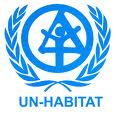 This guidebook by UN-HABITAT, provides an overview of the principles and practices required for sustainable urban water catchment management. It deals with the principles and practices for better management of water resources which, in turn, will lead to general improvement in the health of the local population, food security, environmental protection and sustainable development. It states that it is necessary to develop enduring partnerships among the participating institutions and organizations in the catchment area.
This guidebook by UN-HABITAT, provides an overview of the principles and practices required for sustainable urban water catchment management. It deals with the principles and practices for better management of water resources which, in turn, will lead to general improvement in the health of the local population, food security, environmental protection and sustainable development. It states that it is necessary to develop enduring partnerships among the participating institutions and organizations in the catchment area.
Along side, policies, laws and regulations should be geared to provide an enabling framework as needed for formulation and implementation of action plans at the local level. The guidebook also comprises case studies from Australia, India, Latin America and South Africa to showcase the prospects of local action for water resources management.
